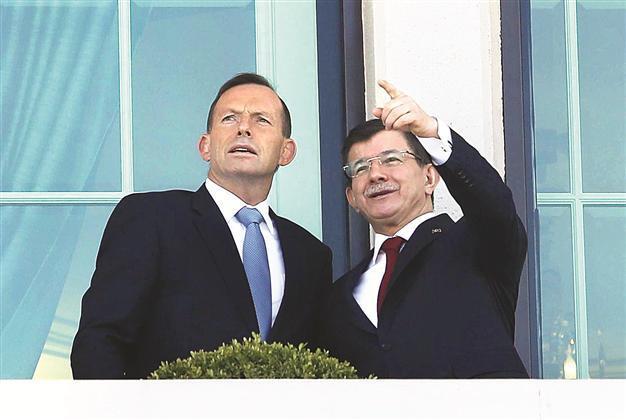Australia and Turkey to counter wannabe jihadists together
Julia Nho

Australian Prime Minister Tony Abbott (L) and Turkey’s Prime Minister Ahmet Davutoglu stands on a balcony during a ceremony at Cankaya Palace in Ankara on April 22, 2015. AFP Photo
Australian Prime Minister Tony Abbot raised concerns about Australians traveling to Turkey to join the Islamic State of Iraq and the Levant (ISIL) during his recent visit to Turkey. During the discussion on counterterrorism, the PM and his Turkish counterpart, Ahmet Davutoğlu, agreed to expand cooperation between the two countries’ security agencies.Unfortunately, Turkey has been a gateway to Syria and Iraq for many foreigners wanting to join ISIL. In the last 12 months, around 25,000 foreigners have gone through the Turkey-Syria border to become jihadists, said terrorism expert Greg Barton of the Global Terrorism Research Centre at Monash University.
The Australian federal government has announced $450 million in the defense budget specifically to counter recruitment propaganda by ISIL and other extremist groups “at home and abroad.”
Australian Foreign Minister Julie Bishop stated in March at least 90 Australians were in Iraq and Syria supporting ISIL, and another 20 Australians had been killed in the conflict. She said she canceled 100 passports on national security grounds.
A recent suicide bomber, Jake Bilardi, a teenager from Melbourne, also traveled via Turkey to Ramadi, Iraq.
Often, many wannabe jihadists avoid the authorities’ radar by first traveling to a “non-Western country that does not require a visa in advance, such as India,” and then flying to small airports in Turkey, Barton told me. He further commented that “they don’t always arrive in Istanbul and the tickets don’t always show the final destination.”
Barton noted the key to bilateral cooperation is intelligence sharing.
Recently, tourist visa requirements in Turkey have changed, responding to the ongoing challenge. Up until last year, tourists could purchase a tourist visa on arrival, but now it can only be done through an online application which requires travelers to state the purpose of their visit and further details. This “allows the officials from Australia and Turkey to keep a database, patterns, network and share analysis,” said Barton.
Peter Jennings, the executive director of the Australian Strategic Policy Institute, wrote in an e-mail response that the two countries should also “look to harmonize any legal processes between Australia and Turkey in ways that will support quick responses to individuals who are identified as potential supporters of ISIS [ISIL].”
He recommended “establishing exchanges of customs and police officials” between the two countries in order to “facilitate closer cooperation and the flow of information.” Through closer cooperation in identifying and tracking, these can be effective in preventing Australians from “transiting Turkey to fight in Syria,” said Director Jennings.
But fundamentally, to foster intelligence sharing, Australia should also do its homework on “identifying the individuals with potential threats, behaviors and individuals’ patterns of contacts” back home, said Barton.
The recent announcement of the defense budget increase is a good start, but determining the specifics of using it effectively is another matter.
According to Professor Geffrey Lewis of Media and Cultural Politics at RMIT University, to conduct a full surveillance on one individual costs about $8 million, and about $1 billion to follow 125 people for a year. It is clearly very “expensive” and the airport control has its limits as well.
As such, a strong level of community engagement and family support is crucial, while gathering intelligence is equally important for the two nations’ intelligence sharing, said Professor Lewis.
Teenagers have been particularly vulnerable to radicalization, as they are still at a developmental stage of their lives. Lewis added, the “ferment of violence” by ISIL attracts teenagers who seek to build their identity, which makes them an easy target.
Barton explained that brainwashing teenagers “can occur quite rapidly,” even in a chat room when a professional ISIL operator goes after young people in a very predatory fashion, targeting this emotional vulnerability.
Lewis emphasized the role of family, as family members can detect at-risk young people much quicker by being around them. The non-punitive but supporting network and civil society based on family needs such as an effective hotline system.
Due to the hotline alerting system, police were able to prevent the Mother’s Day terror attacks plotted by a Greenvale teenager just recently.
In this sense, Australia’s domestic counter-terrorism tactics can also be extended to foiling the wannabe jihadists from traveling to Syria or Iraq, in addition to building a strong database.
Since late last year, there have been inter-agency counterterrorism talks and cooperation, such as the joint training between the Turkish National Police and the Australian Federal Police. In February 2007, Australia and Turkey signed a Memorandum of Understanding (MOU) on counter-terrorism cooperation and organized crime.
Director Jennings forecasted a positive future for Australia-Turkey cooperation, noting the successful security cooperation during the Anzac 100th anniversary ceremony recently.
















